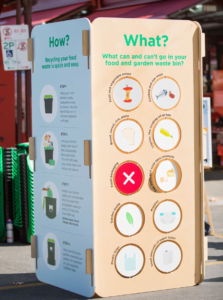Behaviour Change, Rituals and Waste Management
What is your bin ritual? Is it waking up at 5am when you hear the bin truck driving past? Do you have a housemate or a partner that overfills the bin? Did you dress up in lockdown to take the bins out? Do you remind your neighbours that tonight is ‘bin night’?
Waste management seems like a boring and gross topic, but it is intimately connected to our rituals and habits of housekeeping, preparing food and eating which are, in turn, connected to our ideas of self, home and memory. As a society, our waste practices have changed in relation to our eating habits, food production, global markets and environmental factors. In Australia, our current waste practices are unsustainable:
In 2020, Australian households produced 12.4 million tonnes of waste, an increase of 10% since 2017-18 (ABS).
About 130,000 tonnes of plastic leaches into Australian waterways and oceans every year, equivalent to 1,280 kilograms of plastic dumped every hour in Australia’s ocean.
3.3 million tonnes of food waste produced every year, 2.6 million of that from households. This is enough to fill the MCG 6 times!
The current systems that produce, recycle and dispose of what is no longer valuable, desired or seen as useful have to change. This requires not only the technical side of managing waste but a cultural and behavioural change too. Our communities need to re-learn to value waste products and to develop new rituals or habits that preserve, organise or reuse what is currently considered ‘rubbish’.
Changing our behaviour is really difficult but creating new rituals offer a potential way to do it.
Recently, Conversation Co has had the privilege of working with Knox Council to develop a new waste strategy. We have been chatting to community members to understand their waste needs and what supports they might need to reduce their household waste. Part of our job was to introduce a new Food and Organic Waste system and communicate changes to recycling and landfill services. This made for some interesting discussions and an insight into people’s bin rituals.
Here are some reflections from our engagement:People are very interested in waste management
The level of engagement and quality of responses was remarkable. Pretty much everyone creates rubbish and each household has unique processes, habits and ways of managing their waste. This makes a waste management strategy everyone’s business. In this case, our engagement was about providing an interested and engaged community with the right tools, information and supports to affect change.
Threats don’t work
Many community members were frightened of or exhausted by environmental destruction narratives when it came to waste management. Les Robinson, director of Enabling Change Australia, suggests that threats of climate change impacts don’t motivate people to act, but rather can create incapacity, denial or resistance. Community members in Knox wanted systems to be made easy for them to comply.
Share the why
When talking to community members about reducing their waste, the overwhelming response was seeking clarity on the purpose of waste management. Participants at Knox wanted to know the reasons behind changing their waste habits and information about their impact. This might be because rituals are acts tied to our beliefs. Enacting rituals is also a way that we demonstrate our values to others. Communicating these values and purposes behind changes to rituals or acts is essential to behaviour change campaigns.
Share the how
Residents also wanted transparency about what happened to waste once it left their homes to understand how their changed habits contributed to the bigger picture. Many people sought clarity on how to dispose of rubbish correctly and practical advice for incorporating new habits into their waste management ritual. Successful behaviour change campaigns create inspiring real life examples to demonstrate changed habits in an easy to follow way
.
Referenceshttps://www.theguardian.com/sustainable-business/behaviour-change-sustainability-tips
https://www.samedayrubbishremoval.com.au/War-On-Waste-Statistics.php
https://www.sleepsociety.com.au/blog/waste-landfill-statistics
About Ella WestElla, our Engagement Support, is an experienced social researcher with a background in not-for-profit international development. She has experience engaging with diverse communities in India and Cambodia in community development planning, monitoring and evaluation. Ella has worked supporting refugees, asylum seekers and newly arrived communities in Melbourne. She is interested in hearing peoples’ stories and working with their strengths to create unique projects that are committed to social justice and resilient communities.



